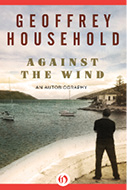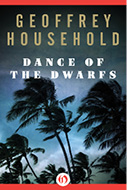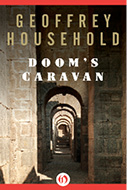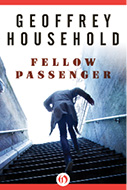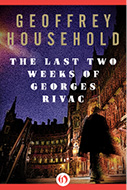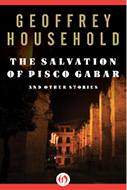Read The Salvation of Pisco Gabar and Other Stories Online
Authors: Geoffrey Household
The Salvation of Pisco Gabar and Other Stories (26 page)
“This was going too far. I shouted âAll aboard,' waved my flag, and blew a blast on the whistle. The line wasn't clear, but Jimmy caught on. He took the brakes off, and the
County of London
shattered the artificial fog with one colossal whoosh of steam. In fact, we put up a most convincing show of a train just about to leave.
“They were just piling into the compartments when Rhoda spoiled the picture. âYou stay there, mister!' she caroled. âWe'll get in when we're bloody well ready!'
“That called our bluff, of course. We couldn't start without themâor rather it hadn't yet occurred to us that we could.
“It was then that the fireman lost his temper. His contempt for Jimmy and myself had been slowly rising. After all he had sold silk stockings through the suburbs, whereas Jimmy had only had to overawe a lot of savages. He got down from the footplate and walked along the platform, wiping his hands on a black yard of oily cotton waste. A horrid weapon against best frocks in a rough-and-tumble. It gave him authority. âGet on in, you silly fools!' he roared.
“It wasn't courage; it was sheer lack of imagination. But his cave-man stuff damn near worked. His silk stockings had taught him a few of the more elementary facts about women. They were so startled that they began to get into the train. âCome on, ma!' he ordered Rhoda, who was rather hesitantly standing her ground.
“She was only about nineteen, and that âma' infuriated her. It struck her right on the sorest spot in her soul. She snatched his oily rag and wiped his face with it.
“That was the detonator in the gelignite. They exploded. All the worry about fathers and brothers on strike, all the year spent behind counters controlling their natural instincts to be rude to people who were rude to them, all was released in one blast of females over that fireman. Before we could get up to the rescue they had dragged him into a compartment. They were yelling with rage. I suppose the only people who hear that sound are the officials of a woman's prison. There was no doubt that the fireman was for it, if we couldn't pull him out.
“It was no good calling for police; there weren't any. We dived under the train and opened the door of the compartment that gave on to the tracks. The fireman's legs were sticking out from a tangled mass of femininity, and still waving feebly. We took a leg each and heaved, and he came out, leaving his coat and shirt behind. On our rush to the engine his trousers dropped off himânot round his ankles, I mean, but vanished, disintegrated.
“Jimmy opened up his steam screen to throw off the pursuit, and we started. This time there was no bluff to call. They knew we were running for our lives and didn't care how many of them we left behind. They all got in, so far as I could see.
“I wiped the worst of the blood and muck off the fireman and dressed him in Jimmy's overalls. He had lost a good deal of skin and part of his scalp, but all the rest of him was present and correct. He gibbered a bit, as was not unnatural, and kept grabbing at my knees.
“Jimmy had the
County of London
pounding along at a steady forty. It was risky, but we were on the main line and we could see a mile ahead. We had it to ourselves. Those damned fellows at Maidenhead had held us up a good ten minutes longer than was necessary. All went well till we were just outside Ealing. There the
County of London
took a horrible lurch to starboard and nearly flung us off the footplate. By the time Jimmy had jammed on the brakes we were careering through a goods yard surrounded by acres and acres of trucks.
“âI'm not stopping till we get to police,' said Jimmy, setting his lips.
“I agreed with him. Anything was better than loosing our five coaches of lunatics into a London unprotected.
“We cut down to ten miles an hour, and at that speed we could hear the turmoil in the coach next to the engine. Somewhere they were singing songs, but most of them were sobbing and yelling. Whenever a door opened, I flung a lump of coal at it.
“The line was clear. Lord knows for what mysterious traffic the points had been set! Once we were in a cutting between houses where the rails were rusty with disuse, and once running alongside a maze of District lines, all of them electrified. The
County of London
was bouncing like a dinghy in a tide rip. She squealed, rocking, round those switch-back curves. I could see that Jimmy was in agony, for he loved that locomotive and the driving of it; but we looked at each other and at the fireman, and we kept going.
“We must have been dodging through the London suburbs for nearly a quarter of an hour when we staggered round the worst of all the curves and down an improbable gradient and saw a deserted station ahead of us.
“âRoyal Oak?' asked Jimmy, as if he had just sighted the coast of America in the wrong place.
“âMust be!' I said.
“Of course it was absurd. When you're running into Paddington on a fast express, Ealing and Royal Oak go by in two flashes. But we hadn't the faintest notion where we were, and it never occurred to us that we had left the Great Western system altogether for outer space. We thought we had merely taken a very roundabout route to Royal Oak, and we blessed it; for Paddington and whole posses of police could only be two minutes away.
“Jimmy opened her out a little, and it was then that we saw a huge notice of earl's court, and the mouth of the east-bound tunnel. As I say, we stopped a matter of three yards from it. We made one collective jump for the stairs, dragging the fireman between us, and got away before the terrors behind us realized what had happened.
“I heard that when the strike was over they took the
County of London
apart, and lifted her out with a crane and a breakdown gang. The professional railwaymen said it was impossible to drive a 4â6â2 locomotive round those curves. I dare say it is; I swear the leading bogie jumped the track once, and then bounced back again. But what really horrified them was anarchy. I don't think it was coincidence that the strike ended two days later.”
All rights reserved, including without limitation the right to reproduce this ebook or any portion thereof in any form or by any means, whether electronic or mechanical, now known or hereinafter invented, without the express written permission of the publisher.
These are works of fiction. Names, characters, places, events, and incidents either are the product of the author's imagination or are used fictitiously. Any resemblance to actual persons, living or dead, businesses, companies, events, or locales is entirely coincidental.
Copyright © 1935, 1936, 1937, 1938, 1939, 1940 by The Estate of Geoffrey Household
Cover design by Drew Padrutt
978-1-5040-0816-7
This edition published in 2015 by Open Road Integrated Media, Inc.
345 Hudson Street
New York, NY 10014


FRESH EBOOK DEALS, DELIVERED DAILY
BE THE FIRST TO KNOW ABOUT
FREE AND DISCOUNTED EBOOKS
NEW DEALS HATCH EVERY DAY
FROM OPEN ROAD MEDIA

